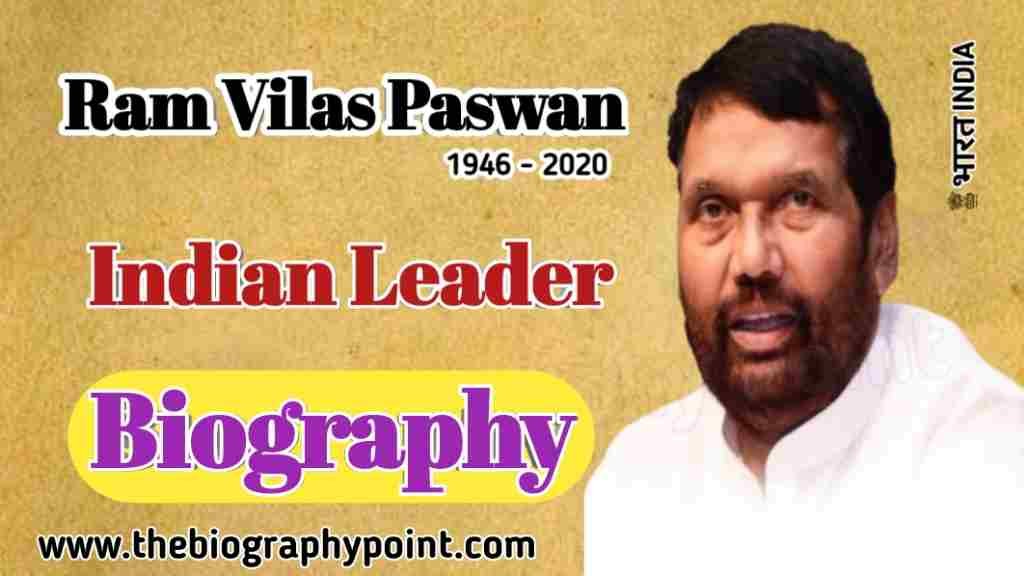| Full Name | Ram Vilas Paswan |
| Born | July 5 1946, Khagariya, Bihar (India) |
| Age | 74 Years |
| Name of Mother’s | Siya Devi |
| Name Father’s | Jamun Paswan |
| Spouse | • Rajkumari Devi (1969-1981) • Reena Paswan (1983-2020) |
| Children’s | 1. Asha Paswan 2.Usha Paswan 3. Nisha Paswan 4. Chirag Paswan |
| Political Party | Lok Janshakti Party (LJP) |
| Brother’s | • Pashupati Kumar Paras • Ram Chandra Paswan |
| Residence | Village+Post – Shaharbanni, Khagariya, Bihar (India) |
| Education | (M.A), (L.L.B) {Patna University} |
| Occupation | Politician |
| Nationality | Indian |
| Died | October 8, 2020, New Delhi, (India) |
| Monank Patel Biography, American Cricketer, Team Captain | Click Here |
| Osama Bin Laden Biography | Al-Qaeda | Terrorist Attacks | Click Here |
Early life and Education
Ram Vilas Paswan was born on July 5, 1946, in a village called Shaharbanni in the district of Khagaria, in the state of Bihar. He had to deal with many difficulties because he was from a Dalit family. Even though Paswan had a tough life, he really liked learning and being involved in politics from when he was young. He finished studying at Kosi College, Khagaria, and later got a law degree and a political science degree from Patna University.
Entry Into Poltics
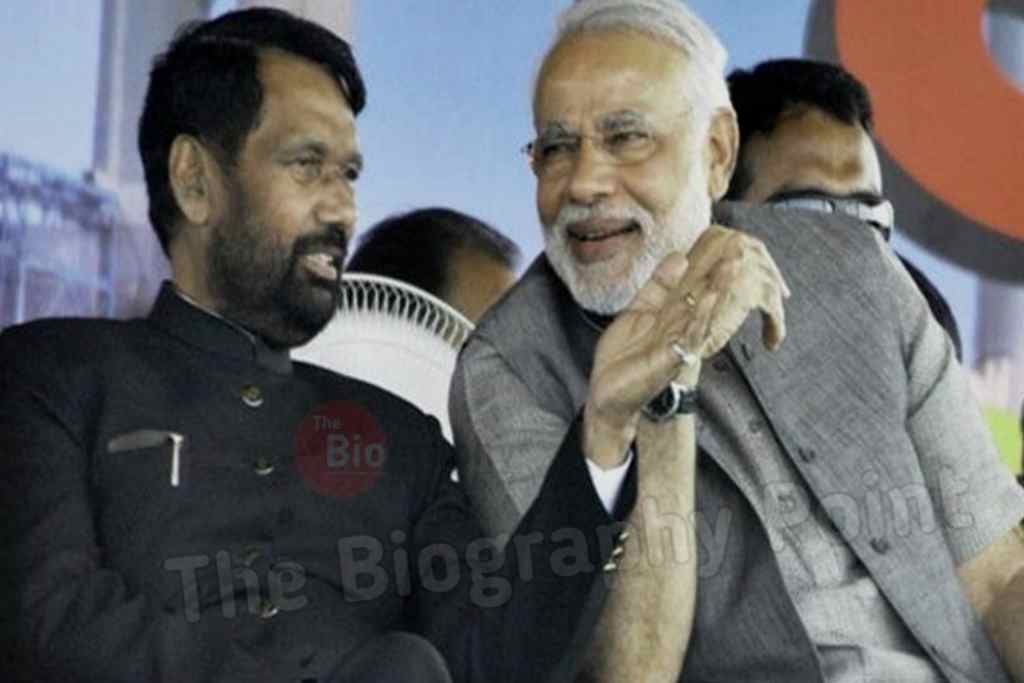
Paswan’s career in politics started in the 1960s when he was in college and joined the Samyukta Socialist Party. He moved up fast because he was good at speaking and cared about fair treatment for everyone. In 1969, when he was 23 years old, he got chosen to be a part of the Bihar Legislative Assembly. This was the beginning of his long and important career in politics.
Emergency and Aftermath
Ram Vilas Paswan did an important job during the time when Prime Minister Indira Gandhi declared an Emergency from 1975 to 1977. He was jailed for speaking out against the government’s strict actions. The time of trouble in politics made him become even more strong in supporting democracy and speaking up for people who are treated badly.
After the crisis, Paswan joined the Janata Party, which won a big victory in the 1977 elections. He won the election to represent the Hajipur area in Bihar in the Lok Sabha by a huge margin. This achievement got him listed in the Guinness Book of World Records.
Information of Lok Janshakti Party
In 2000, Paswan started a new political party called Lok Janshakti Party (LJP) because he left the Janata Dal party. The LJP wanted to speak up for people who were not treated fairly, especially Dalits and people from poorer backgrounds. Under his guidance, the party became important in Bihar politics and often helped form coalition governments in the state and country.
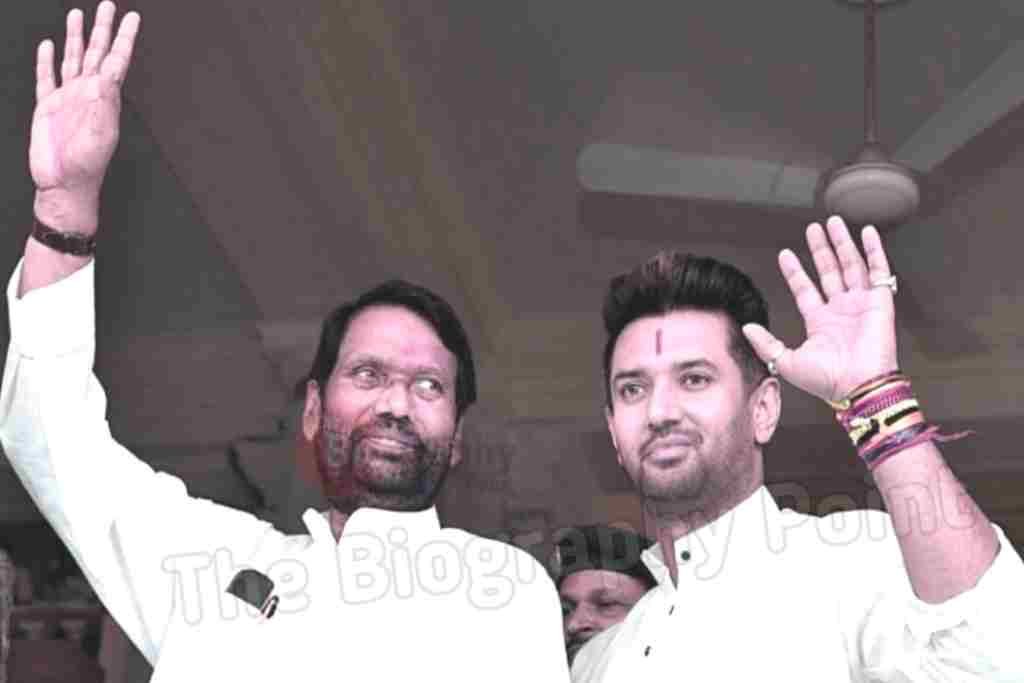
Ministerial Roles
Paswan’s political career is marked by his service in various ministerial capacities across multiple governments:
- Minister of Labour and Welfare (1989-1990): During the tenure of Prime Minister V.P. Singh, Paswan focused on labor rights and social welfare schemes.
- Minister of Railways (1996-1998): Serving in H.D. Deve Gowda’s and I.K. Gujral’s cabinets, he worked towards improving railway infrastructure and services.
- Minister of Communications (1999-2001): Under Prime Minister Atal Bihari Vajpayee, Paswan spearheaded reforms in the telecommunications sector, facilitating the expansion of mobile telephony in India.
- Minister of Coal and Mines (2001-2002): He addressed issues related to the coal industry and worked towards improving the working conditions of miners.
- Minister of Chemicals and Fertilizers (2004-2009): In Manmohan Singh’s cabinet, Paswan was instrumental in policy-making for the pharmaceutical industry and the distribution of fertilizers to farmers.
- Minister of Consumer Affairs, Food and Public Distribution (2014-2020): Under Prime Minister Narendra Modi, Paswan worked on the implementation of the National Food Security Act and initiatives aimed at consumer protection.
Social Reforms and Advocacy
Throughout his time in politics, Ram Vilas Paswan always spoke up for fairness and equality, especially for Dalits and other communities who are often left out. He wanted to make sure that everyone had the same opportunities. He supported affirmative action and worked to make sure that people from lower classes have more chances to get government jobs and go to school.
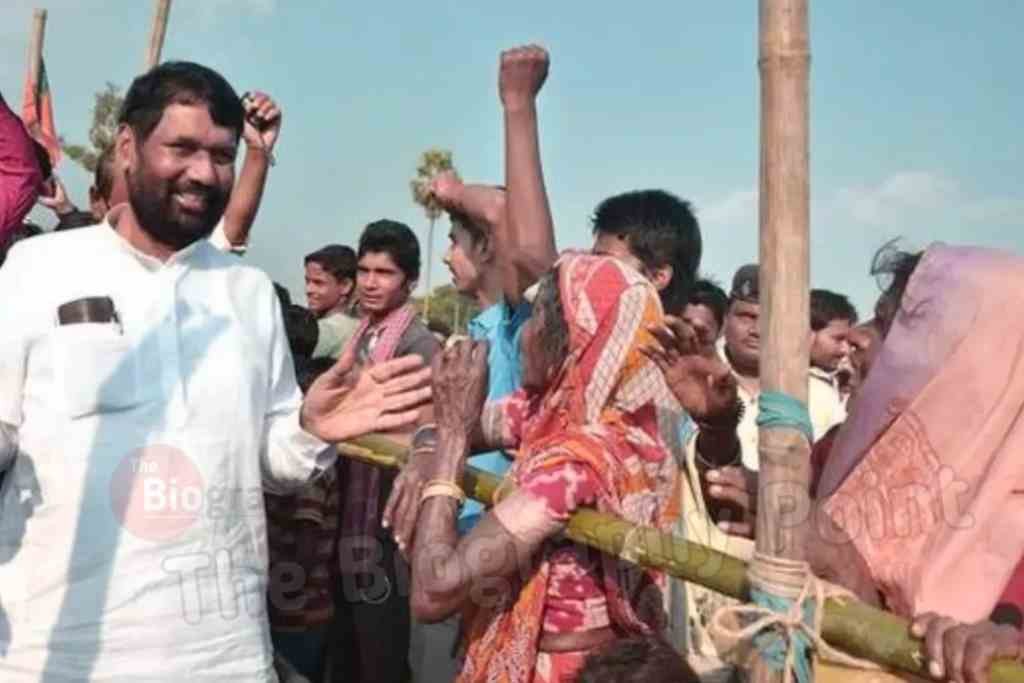
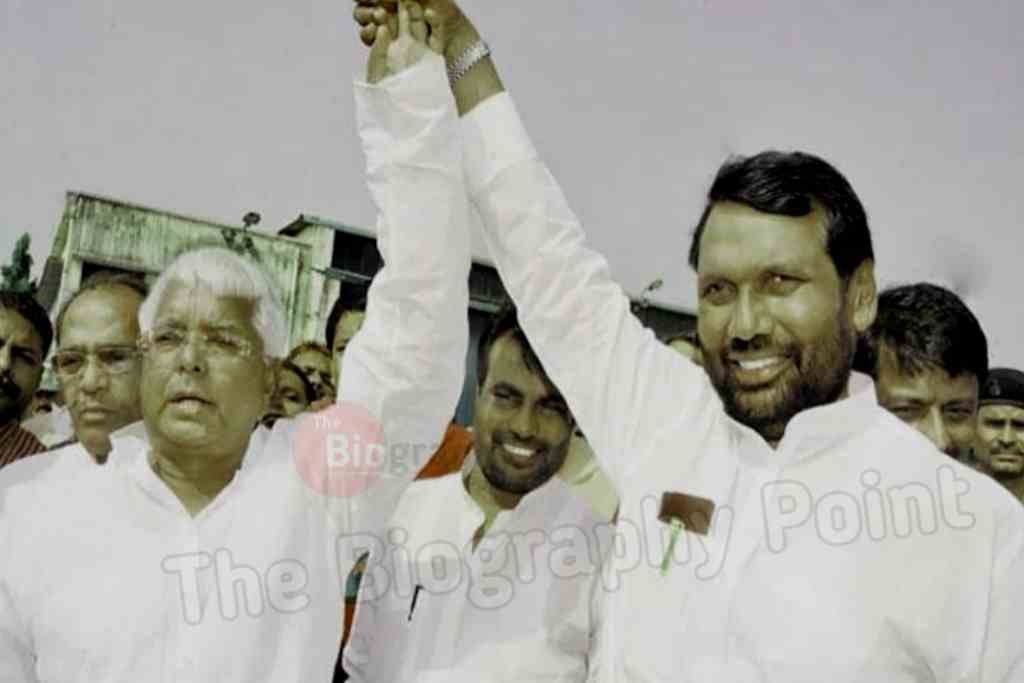
Paswan also supported the idea of people from different religions living together peacefully and worked to make sure there was no fighting between different religious groups. He thought it was important that everyone be included in politics and always talked about how it was important for different social and religious groups to come together.
Legacy and Personal Life
Ram Vilas Paswan was good at understanding politics and making friends with different political parties. His ability to understand politics made other leaders respect him, and he was seen as a very influential person in Bihar politics.
Personally, Paswan got married to Rajkumari Devi in 1960, but they got divorced in 1981. In 1983, he married Reena Sharma, who worked as an air hostess. He had two girls from his first marriage and one boy and one girl from his second marriage. His son, Chirag Paswan, started doing the same job as his father. He joined politics and became the leader of the Lok Janshakti Party after his father passed away.
Death and Tributes
Ram Vilas Paswan passed away on October 8, 2020, after a prolonged illness. His death marked the end of an era in Indian politics. Leaders from across the political spectrum paid tribute to his contributions and legacy. Prime Minister Narendra Modi described him as a visionary leader who devoted his life to the empowerment of the marginalized and the welfare of the poor.
Conclusion
Ram Vilas Paswan has spent his life fighting for fairness and equal rights. He started in a small village in Bihar and became a powerful leader in India. His story shows how he never gave up and worked hard to help others. Paswan’s impact on Indian politics, especially in the areas of fair treatment and policies to help those in need, will be remembered for a long time to come.
Frequently Asked Questions (FAQs) About Ram Vilas Paswan Biography: Poltics Career, Successful Story, Born, Age, Height, Wife:
Q. What was Ram Vilas Paswan’s contribution to Indian politics?
Ans. Ram Vilas Paswan was known for his efforts to uplift marginalized communities and his role in various ministries, contributing significantly to India’s public distribution system and consumer rights.
Q. When did Ram Vilas Paswan start his political career?
Ans. He started his political career in 1969 as a member of the Bihar Legislative Assembly.
Q. What positions did Ram Vilas Paswan hold in the Indian government?
Ans. He held several key positions, including Union Minister for Consumer Affairs, Food and Public Distribution, and Union Minister for Chemicals and Fertilizers, among others.
Q. What party did Ram Vilas Paswan found?
Ans. He founded the Lok Janshakti Party (LJP) in 2000.
Q. How many times was Ram Vilas Paswan elected to the Lok Sabha?
Ans. He was elected to the Lok Sabha nine times.
Q. What was Ram Vilas Paswan’s role in the public distribution system?
Ans. As the Union Minister for Consumer Affairs, Food and Public Distribution, he worked to ensure food security and strengthen the public distribution system in India.
Q. Did Ram Vilas Paswan receive any awards or recognitions?
Ans. Yes, he received several awards and recognitions for his work in public service and his efforts to uplift marginalized communities.
Q. What was Ram Vilas Paswan’s educational background?
Ans. He held a Master’s degree in Arts and a Bachelor of Laws degree from Patna University.
Q. What were some of the major policies implemented by Ram Vilas Paswan?
Ans. He was instrumental in implementing policies related to consumer rights, food security, and social justice.
Q. How did Ram Vilas Paswan contribute to the Dalit community?
Ans. He championed the rights of the Dalit community and worked to implement policies that promoted their social and economic upliftment.
Q. What was Ram Vilas Paswan’s stance on social justice?
Ans. He was a strong advocate for social justice and worked to address issues of inequality and discrimination.
Q. Who succeeded Ram Vilas Paswan as the leader of the Lok Janshakti Party?
Ans. His son, Chirag Paswan, succeeded him as the leader of the LJP.
Q. What legacy did Ram Vilas Paswan leave behind?
Ans. He left a legacy of dedicated public service, advocacy for marginalized communities, and significant contributions to India’s public distribution system.
Q. How did Ram Vilas Paswan’s policies impact the Indian economy?
Ans. His policies in consumer affairs and food distribution had a positive impact on the Indian economy by ensuring food security and consumer protection.
Q. What was Ram Vilas Paswan’s approach to coalition politics?
Ans. He was known for his ability to build alliances and work effectively in coalition governments, which helped him maintain a significant role in Indian politics across different administrations.

